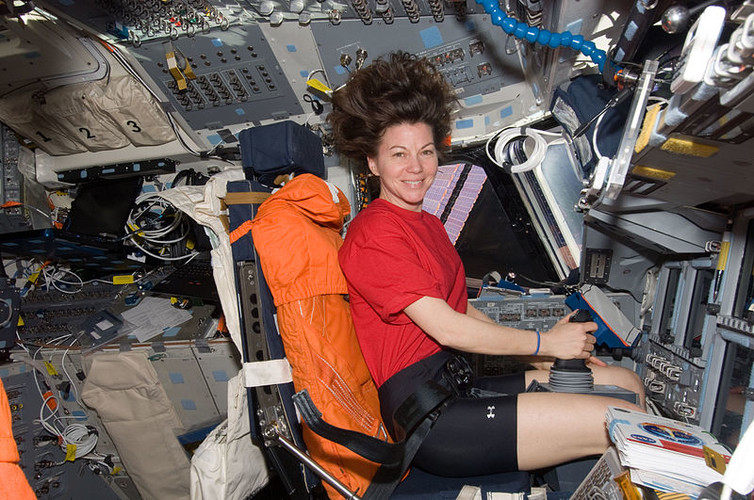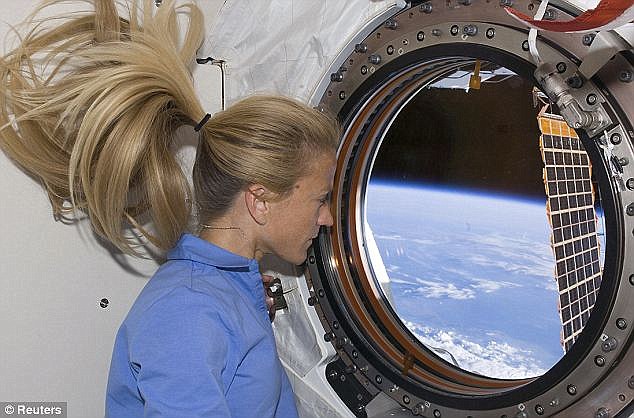Who was the first woman to have her period in space? What is it like changing sanitary products while being weightless? And why doesn’t menstrual flow just float up into the body when gravity isn’t around?

These were some of the questions I had when I started researching female astronaut health. The human body goes through a lot of changes when in space. Not having gravity to constantly work against, it loses bone density and muscle mass. The cardiovascular system gets lazy and the body’s balance control mechanisms have to completely readapt themselves to find a new norm.
Therefore, I was surprised to learn that one system that doesn’t change at all is the female menstrual cycle. Studies have shown that women can have periods as normally in space as they do on Earth. What’s more, menstrual blood flow isn’t actually affected by the weightlessness we experience in space, so it doesn’t float back in – the body knows it needs to get rid of it.
The fact that women can get periods in space was once used as an argument that women shouldn’t be astronauts. However, we now know that periods don’t impair an astronaut’s ability. Nevertheless, it may be something that female astronauts simply don’t want to deal with.
A personal choice
Luckily, there are ways to stop women from having periods these days. But research studies have shown that there are certain groups of women who identify with their periods, feeling it is natural to have a monthly cycle, while others would be happy to never have a period again. Experts haven’t reached a consensus on whether to routinely recommend complete menstrual suppression, but the majority do suggest there are no long-term side effects to not bleeding.
There are no rules or regulations surrounding what a female astronaut should do about her period – it is a completely personal choice. Some female astronauts have felt menstrual suppression is not suitable for them and therefore have chosen to menstruate in space. However, when making the decision a female astronaut may want to consider some of the challenges of getting periods in space. These tend to be related to the practicalities of hygiene – wash water is limited and changing sanitary products while floating in space would also be quite a task.
If a woman decides against having her periods in space – as many of the long-duration fliers do – their current best available option is to use the oral contraceptive pill. On Earth, the so called “combined” oestrogen-based contraceptive pill, which prevents ovulation, is taken for three weeks in a row, with a fourth pill-free week to allow for a periodic bleed. However, astronauts who do not want to menstruate can take these pills back-to-back and forgo that week of bleeding. For fit and healthy women, doing this is not linked to any harmful side effects.
But an issue is that, for a three-year mission (say, to Mars and back), you’d need about 1,100 pills to keep periods away – and the flight needs to cope with carrying and disposing of all the packaging, including the cost of launching any extra payload into space. The same problem applies to sanitary products.
We are, however, discovering a number of different options. My recent research suggests long-acting reversible contraceptive (LARC) agents, implants that are typically put under the skin or within the uterus to slowly release menstruation-supressing hormones, may be more convenient. After all, it may be difficult to remember to take a pill at a certain time each day when managing training schedules and multiple long-haul flights with the added difficulty of changing time zones.
But are they safe? My study didn’t find any evidence that the huge acceleration forces on the body, during launch or landing, could actually damage these devices. But we still don’t know exactly how the implant would fare under specialist diving or spacewalk clothing which lies close to the skin.
Despite the advances in space-based research, there’s a lot we still don’t know. One issue is what effect different contraceptives have on bone mineral density. A lack of minerals in our bones increases the risk of conditions such as osteoporosis and fractures. Astronauts lose bone at a much higher rate than on Earth, and there is some evidence that certain contraceptives, such as injections with synthetic progestogen, may make this worse. However, more research is needed for us to fully understand the risks.
Reproductive health
There’s a lot more we don’t know about female astronaut health. One is the impact on fertility as a result of spaceflight. A study from the 1990s suggested that spaceflight did not have a significant impact on female fertility. A woman’s fertility does, however, decrease with age. So if female astronauts are trying to have their first baby after the age of 41 years – and struggling – it is difficult to tease out whether spaceflight has had an impact, or just age.
Having babies in space is a far-fetched idea, as the radiation impact in space would be severely detrimental to the unborn child – leaving this as a completely unethical area of research. Only once advances in radiation research have progressed to a point where we can safely protect humans from space radiation on long duration missions could we properly ask whether women can carry a pregnancy in space.
However, when it comes to the impact of suppressing menstruation in space, it is possible to do more research. This will be crucial if we want to send astronauts on increasingly long missions such as to Mars and beyond. Luckily, we are already making progress. Our systematic work means there is, for the first time, a “go to guide” for female astronauts looking to make the right choices for them.














